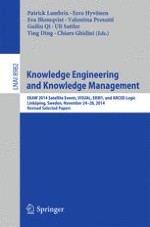2015 | Buch
Knowledge Engineering and Knowledge Management
EKAW 2014 Satellite Events, VISUAL, EKM1, and ARCOE-Logic, Linköping, Sweden, November 24-28, 2014. Revised Selected Papers.
herausgegeben von: Patrick Lambrix, Eero Hyvönen, Eva Blomqvist, Valentina Presutti, Guilin Qi, Uli Sattler, Ying Ding, Chiara Ghidini
Verlag: Springer International Publishing
Buchreihe : Lecture Notes in Computer Science
